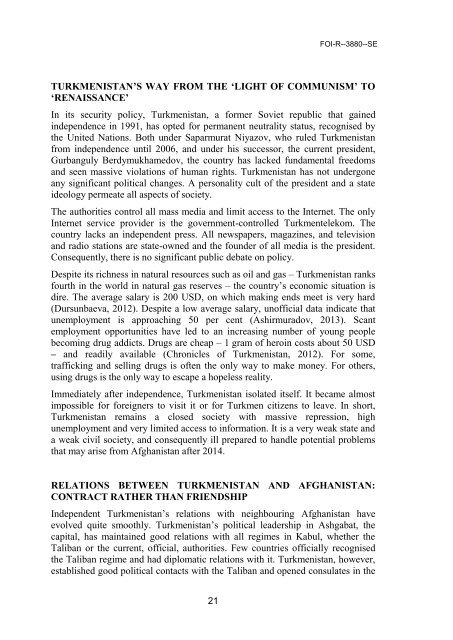foir_3880
foir_3880
foir_3880
Create successful ePaper yourself
Turn your PDF publications into a flip-book with our unique Google optimized e-Paper software.
FOI-R--<strong>3880</strong>--SE<br />
TURKMENISTAN’S WAY FROM THE ‘LIGHT OF COMMUNISM’ TO<br />
‘RENAISSANCE’<br />
In its security policy, Turkmenistan, a former Soviet republic that gained<br />
independence in 1991, has opted for permanent neutrality status, recognised by<br />
the United Nations. Both under Saparmurat Niyazov, who ruled Turkmenistan<br />
from independence until 2006, and under his successor, the current president,<br />
Gurbanguly Berdymukhamedov, the country has lacked fundamental freedoms<br />
and seen massive violations of human rights. Turkmenistan has not undergone<br />
any significant political changes. A personality cult of the president and a state<br />
ideology permeate all aspects of society.<br />
The authorities control all mass media and limit access to the Internet. The only<br />
Internet service provider is the government-controlled Turkmentelekom. The<br />
country lacks an independent press. All newspapers, magazines, and television<br />
and radio stations are state-owned and the founder of all media is the president.<br />
Consequently, there is no significant public debate on policy.<br />
Despite its richness in natural resources such as oil and gas – Turkmenistan ranks<br />
fourth in the world in natural gas reserves – the country’s economic situation is<br />
dire. The average salary is 200 USD, on which making ends meet is very hard<br />
(Dursunbaeva, 2012). Despite a low average salary, unofficial data indicate that<br />
unemployment is approaching 50 per cent (Ashirmuradov, 2013). Scant<br />
employment opportunities have led to an increasing number of young people<br />
becoming drug addicts. Drugs are cheap – 1 gram of heroin costs about 50 USD<br />
– and readily available (Chronicles of Turkmenistan, 2012). For some,<br />
trafficking and selling drugs is often the only way to make money. For others,<br />
using drugs is the only way to escape a hopeless reality.<br />
Immediately after independence, Turkmenistan isolated itself. It became almost<br />
impossible for foreigners to visit it or for Turkmen citizens to leave. In short,<br />
Turkmenistan remains a closed society with massive repression, high<br />
unemployment and very limited access to information. It is a very weak state and<br />
a weak civil society, and consequently ill prepared to handle potential problems<br />
that may arise from Afghanistan after 2014.<br />
RELATIONS BETWEEN TURKMENISTAN AND AFGHANISTAN:<br />
CONTRACT RATHER THAN FRIENDSHIP<br />
Independent Turkmenistan’s relations with neighbouring Afghanistan have<br />
evolved quite smoothly. Turkmenistan’s political leadership in Ashgabat, the<br />
capital, has maintained good relations with all regimes in Kabul, whether the<br />
Taliban or the current, official, authorities. Few countries officially recognised<br />
the Taliban regime and had diplomatic relations with it. Turkmenistan, however,<br />
established good political contacts with the Taliban and opened consulates in the<br />
21


